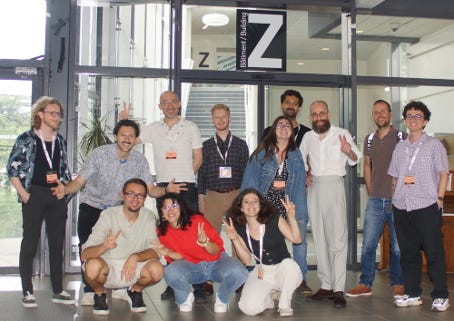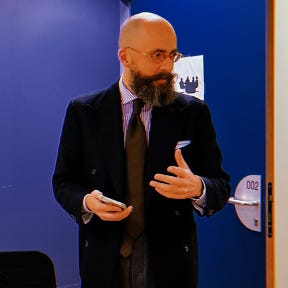The Centre for Philosophy of Memory: The story so far
Kourken Michaelian and Denis Perrin (Université Grenoble Alpes)
We write this post while on our way to the second Shanghai-Grenoble Philosophy of Memory Workshop (about which Lex Lai wrote recently on this blog). The first Shanghai-Grenoble Philosophy of Memory Workshop, which took place early in 2019, was the very first event (co)organized by the Centre for Philosophy of Memory after it was established in the fall of 2018. The second workshop thus provides an appropriate occasion on which to reflect on the story of the CPM so far.
The context in 2018
Philosophy of memory was just becoming self-aware as a field when we took the decision to create the CPM at the Université Grenoble Alpes in 2018. The field had started to take shape several years earlier, as philosophers whose research focused on memory found each other and as their number increased beyond a critical threshold.

By 2017, it was clear that something was afoot. The volume of published research was growing rapidly (see figure 1). A new Stanford Encyclopedia of Philosophy entry on memory had just been published, as had the Routledge Handbook of Philosophy of Memory, the first reference work in the field. Issues in Philosophy of Memory, the first conference in the field, was held in 2017, and the Philosophy of Memory Organization (PhOMO) was founded with the primary aim of ensuring that further iterations of the conference would occur.
Getting the centre up and running
The context in 2018 thus lent itself to the creation of a centre for philosophy of memory, but getting the CPM up and running nevertheless required overcoming a number of challenges. Initially, there were only two CPMers (Michaelian and Perrin), and the centre had no office space, website, or infrastructure of any sort. We were soon joined by two postdocs, André Sant’Anna and Chris McCarroll, we obtained office space, we set up a website, and the group began to develop a culture and a set of activities.
An important element of the culture of the CPM has always been support for early-career researchers, who are fully involved in all of the centre’s activities. Another important element is collaboration. Each member of the centre has his or her own research programme, and they often disagree sharply even with respect to the most central questions of the field. Work at the centre is nevertheless done in a highly collaborative manner, with members regularly coauthoring, coediting, and coorganizing.
This collaboration is made possible by the fact that members work at the centre on a daily basis. (It was in virtue of the need to enable this sort of face-to-face collaboration that obtaining space for the centre, which had been far from a foregone conclusion, was an important early goal for us.) From the outset, the CPM has had a strongly international orientation, hosting visiting researchers from around the world and co-organizing workshops with a wide range of international partners. It has also, while maintaining a strongly analytic orientation, remained open to a variety of philosophical approaches to memory, actively engaging with, for example, the phenomenological and Bergsonian traditions. It has, however, deliberately downplayed interdisciplinary approaches.
The disciplinary strategy
This is not to say that it is opposed to the sort of interdisciplinarity lauded by John Sutton in his inaugural post for this blog. Many of its members have interdisciplinary collaborations, and the centre has organized both a number of interdisciplinary workshops and the 2024 conference of the European Society for Philosophy and Psychology. But memory is a much less well-established topic in philosophy than it is in psychology and related disciplines, disciplines whose members dramatically outnumber philosophers, and we have therefore elected to give priority to developing philosophy of memory as a field in its own right—a field with its own questions, methods, concepts, and debates.
That this choice of disciplinarity over interdisciplinarity was the right one to make is suggested by the success of the CPM’s activities, which include three seminars (its highly active internal seminar, its public seminar, and the online Bochum-Grenoble-Taipei Memory Colloquium that it coorganizes) and an average of about seven workshops per year. In addition to the 2024 ESPP, it organized Issues in Philosophy of Memory 2 in 2019 and the early-career researchers conference of the francophone Société de Philosophie Analytique in 2023.
In total, the CPM has organized roughly three hundred meetings of its three seminars and roughly thirty-five workshops and conferences. (These numbers and those given below were current as of October 2024.) It has hosted about fifty visiting researchers from over twenty countries. It publishes PhilMemBib, a comprehensive philosophy of memory bibliography now including about 2500 entries. It organizes (together with the Review of Philosophy and Psychology) a biannual essay prize competition for early-career researchers. It has published a steady stream of articles and chapters and has edited multiple books and special issues—in total, about seventy articles and chapters and six edited collections. And it has been successful in obtaining funding to support all of these activities.
The CPM today
Initially, there were two CPMers, then four. Today, there are fifteen. Sant’Anna and McCarroll have moved on to new positions. James Openshaw spent several years as a postdoc at the CPM and has likewise moved on. All three former postdocs contributed greatly to the development of the CPM and remain actively involved as affiliated members of the centre. Today, the CPM has three postdocs: Nikola Andonovski, Jakub Rudnicki, and Jelena Markovic. It has six PhD students—this is in addition to one completed PhD, Vilius Dranseika, who remains involved as an affiliated member. And it has several master’s students. Like the centre’s former postdocs, all of these early-career researchers contribute greatly to the CPM, which has been and continues to be very much a team effort.
The growth that the CPM has undergone has brought with it a new set of challenges. More office space was required, we came to need a dedicated meeting room, and a more formal internal structure (involving, for example, regular lab meetings) became necessary, as did defined internal means of communication (such as a shared calendar and an internal mailing list).
The main challenge has been and continues to be that of obtaining funding. The funding that the CPM has obtained from all external and internal sources so far amounts to roughly 1.5 million EUR in total. The cost of obtaining this funding, measured in terms of time spent on both successful and unsuccessful applications, is significant, but, as it is straightforwardly impossible for a group like the CPM to function without funding, the cost is well worth paying.
The CPM tomorrow
In the six or so years since the CPM was founded, the philosophy of memory has continued to undergo rapid growth. To provide just a couple of examples, the Eurasian Memory Network has recently been created, with a regional focus intended to complement the global focus of PhOMO, and the growth in the literature has been such that a new handbook has already become necessary—André Sant’Anna and Carl Craver are at work on the Oxford Handbook of Philosophy of Memory, which should be out next year. We hope that the CPM will continue to contribute to the growth of the field for the next six years and beyond.





The history of the creation and development of research center and trend on the philosophy of memory is exciting. The emphasis on "disciplinarity" rather than "interdisciplinarity" in the article is significant. I'm not sure of another such history in modern philosophy that arose not from an institutional decision, but from research enthusiasm.